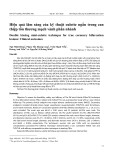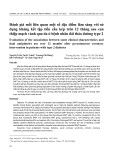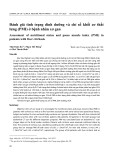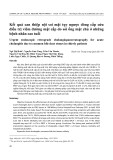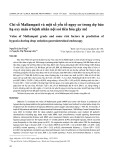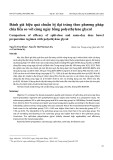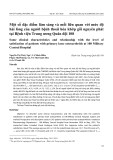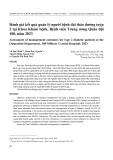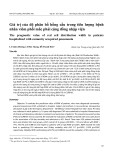
5
Tạp chí Y Dược học - Trường Đại học Y Dược Huế - Số 17
- Địa chỉ liên hệ: Nguyễn Hải Thủy, email: nhthuy52@gmail.com
- Ngày nhận bài: 10/7/2013 * Ngày đồng ý đăng: 25/9/2013 * Ngày xuất bản: 30/10/2013
TESTOSTERONE VÀ HỘI CHỨNG CHUYỂN HÓA NAM GIỚI
Nguyễn Hải Thủy
Trường Đại học Y Dược Huế
Tóm tắt
Testosterone (T) là nội tiết tố nam quan trọng, có vai trò trong hoạt động tình dục của nam giới và sự
phát triển của các đặc điểm giới tính thứ cấp của nam giới (râu, lông, tóc, tinh hoàn và dương vật…).
Testosterone cũng còn có tác dụng bảo vệ tổ chức xương, các mô cơ và một số biểu hiện tâm thần kinh.
Nồng độ testosterone huyết thanh thấp thường gây ra hội chứng suy sinh dục nam ảnh hưởng với tình
trạng sức khỏe lâu dài bao gồm một số bệnh lý liên quan như tim mạch và rối loạn chuyển hóa.
Hội chứng chuyển hóa (HCCH) là một bệnh lý phổ biến hiện nay, là điều kiện đặc trưng bởi một số yếu
tố xảy ra đồng thời gây mất cân bằng chuyển hóa thường ở giai đoạn sớm của bệnh tháo đường týp 2
cũng liên quan đến thiếu hụt testosterone. Có nhiều bằng chứng ghi nhận nồng độ testosterone thấp là
một yếu tố nguy cơ độc lập cho sự phát triển của hội chứng chuyển hóa ở nam giới. Nhiều nghiên cứu
lâm sàng cho thấy liệu pháp testosterone thay thế đã được chứng minh sự cải thiện chất lượng sống cho
bệnh nhân hội chứng chuyển hóa nam giới.
Từ khóa: Testosterone, hội chứng chuyển hóa.
Summary
TESTOSTERONE AND METABOLIC SYNDROME IN MEN
Nguyen Hai Thuy
Hue University of Medicine and Pharmacy
Testosterone is vital hormone for men’s health and a
keyplayer
in glucose homeostasis, lipid metabolism,
and
cardiovascular
pathology. Testosterone deficiency is associated with age, many chronic health
conditions and other metabolic disorders. There is strong evidence that a low
testosterone
level
has
a high
prev
alence in men with metabolic syndrome. Many
components
of
metabolic
syndrome are
adversely affected especially in
rela
tion to
cardiovascular
risk in the presence
of
hypogonadism.
Testosterone
deficiency is a
r
isk factor in itself for the
subsequent development of
the metabolic
syndrome
.
The hypothesis suggests that
lo
w
testosterone
as a result of high
aromatase
a
ct
iv
it
y
leads
to a cycle which
promotes
increasing
ad
i
po
cyte
number
and fat
deposition
which
gra
du
a
ll
y
leads
to a lower
testosterone
level.
T
he
h
yp
o
go
nada
l
-
ob
e
si
ty
-
adi
po
cy
to
ki
ne
h
yp
o
th
es
i
s
explains why the
body cannot respond to
lo
w
testosterone
levels by a
compensatory
pr
od
uc
ti
o
n
of the
hormone.
T
he
interventional
studies have shown
that
testosterone administration o
n
hypogonadal
men
with metabolic syndrome has beneficial
effects
.
These benefits have not only found that
hy
pogo
nadal
symptoms such as sexual function
improv
e,
but key metabolic markers also improve. It must also not
be forgotten that
testosterone replacement therapy
in
hypogonadal
men with
metabolic
syndrome
can have a major
impact
on the patient’s quality of life and w
ell-being.
Key words: testosterone, metabolic syndrome.
1. ĐẠI CƯƠNG VỀ TESTOSTERONE
1.1. Đại cương về testosterone
Các androgene sinh dục nam bao gồm
testosterone (T), Dihydro-testosterone (DHT),
Androstenedione, Dehydroepiandrosterone (DHEA)
và Dehydro-epiandrosterone (DHEAS), có cấu
trúc steroid, được sản xuất từ vỏ thượng thận,
tuyến sinh dục, hoàng thể và đơn vị thai-nhau
thai. Trong số đó testosterone là hormon sinh dục
chủ yếu được tổng hợp tại tinh hoàn do tế bào
Leydig (95%).
Sự bài tiết testosterone xảy ra ngay từ tuần
TỔNG QUAN
DOI: 10.34071/jmp.2013.5.1
















